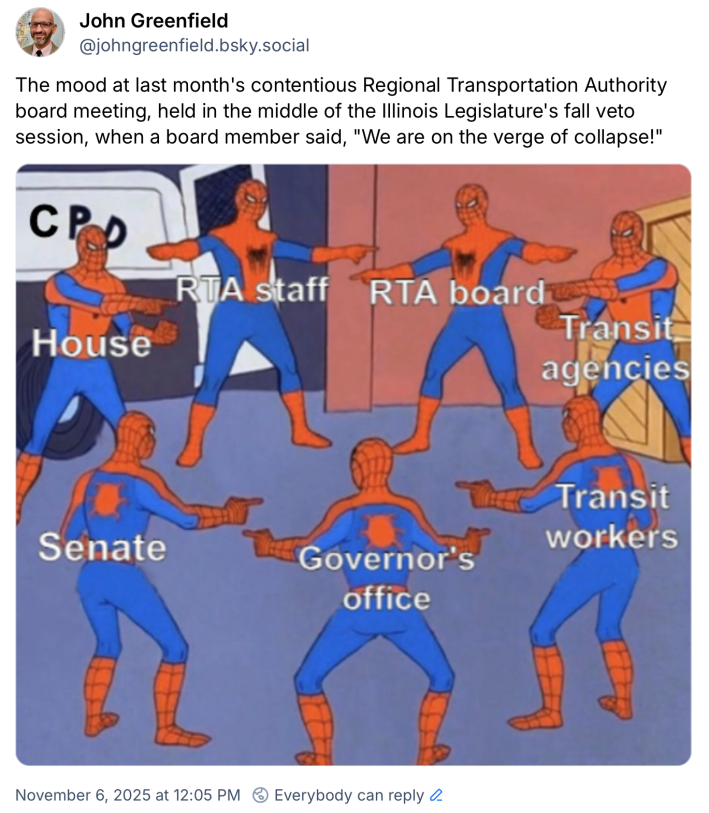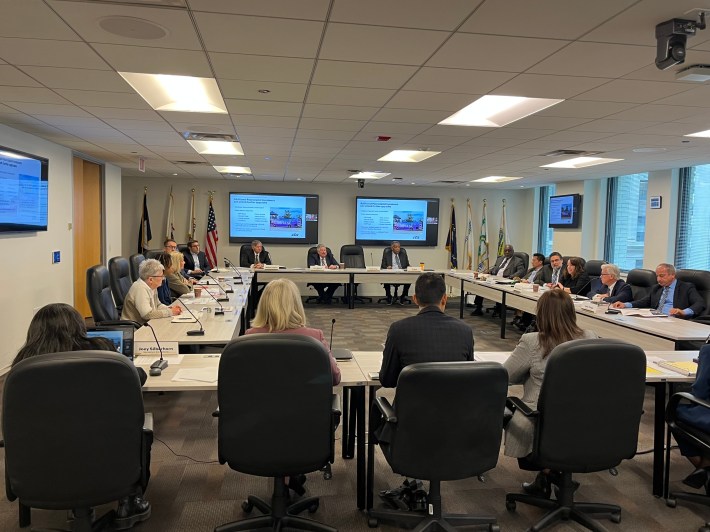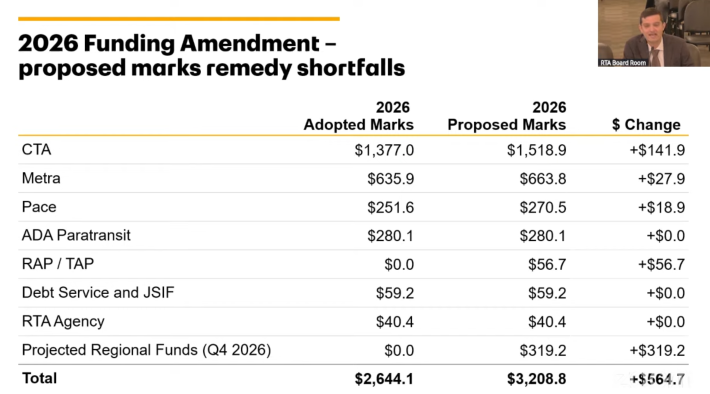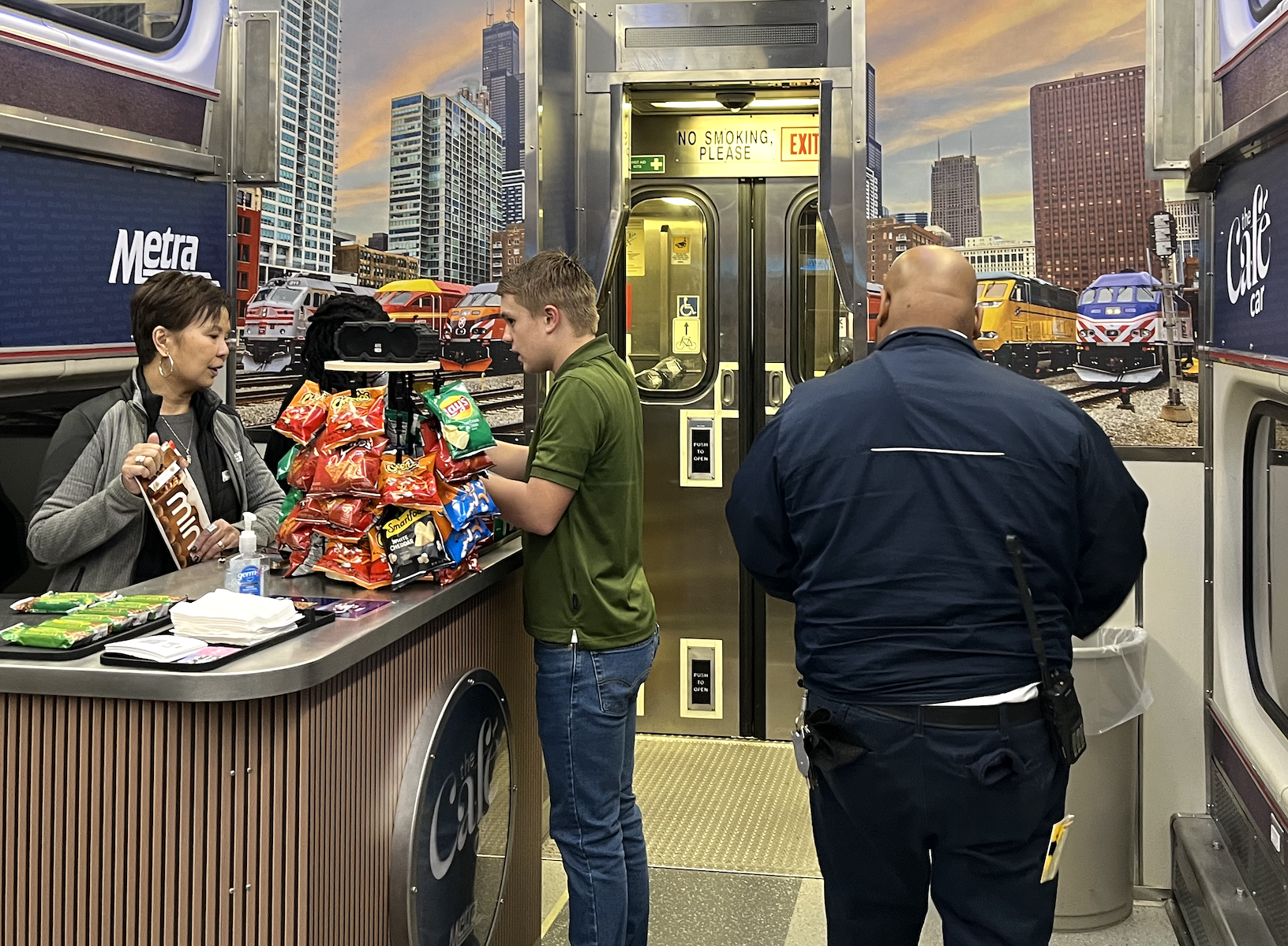
The October 23 Regional Transit Authority board meeting, in the midst of Springfield's fall veto session on the brink of the transit fiscal cliff, was a contentious affair. It was basically a Spiderman Pointing Circle of people blaming each other for the dire straits Chicagoland transit was facing.
In my writeup, I opted not to discuss that discord at legth, reasoning it made more sense for transit boosters to present a united front to the Illinois General Assembly in order to win $1.5 billion in new annual state funding. Instead, I focused on some of the more interesting aspects of the meeting, such as Woodstock's former mayor and "groundhog whisperer" Dr. Brian Sager arguing the proposed governance structure cast a shadow on the plan.
But Sun-Times' David Struett nicely summarized the circular firing squad: "The RTA’s board expressed feelings ranging from frustration to hopelessness during a board meeting Thursday, as time winds down..." Board member Nora Cay Ryan lamented, "We are on the verge of collapse!"

However, as SBC readers are well aware, the revenue, as well as the proposal for a more clout-heavy RTA replacement called the Northern Illinois Transit Authority, actually did pass the legislature during the wee hours of October 31. I've dubbed that improbable outcome, facilitated by strong persuasion from Governor JB Pritzker and surprising flexibility from previously resistant road building unions like Local 150, the Halloween Miracle.
As such, this morning's special RTA board meeting started out as less of a blame game, and more of an expression of sweet relief and gratitude. The hearing also had something of a bitter-sweet quality, since the current umbrella agency's days are numbered, so its staff and directors NITA get ready for a changing of the guard.

RTA board captain Kirk Dillard set the tone by vaporizing last month's mutinous sentiments with a feel-good message. "Before we begin, I just want to express my deep gratitude to the many people who worked to get us to the point where we are today," he said. "It's nice to have an upbeat meeting where we can say confidently that in 2026 we will not see any cuts to service. We will not see any layoffs, pending our action today and riders will not see fare increases, and instead will continue to see improvements in service."
"I want to especially thank [Governor JB Pritzker]," Dillard added. "I did it in person the day before yesterday, and I want to thank the leaders in the House and the Senate who worked so tirelessly on this bill, although we're all tired because we left the Capitol Building at about 5 a.m. on... Friday morning."
"But I especially want to thank Rep. Eva-Dina Delgado and Rep. Kam Buckner, that great former Illini football player, and Senator Rahm Villivam," Dillard continued. "These three individuals, ate, lived, and breathed this like we all did here over the last couple of years."
"And to our labor partners, I've expressed this to [Chicago Federation of Labor's] Nora Cay Ryan," Dillard said. "I talked to Tim Drea from the AFL-CIO yesterday. The labor partners and the staff of all the transit agencies were magnificent. My sincere thanks to their hard work over the last three years."
"And I especially want to thank the advocacy community of riders across the region," he added. "From those in the disability community who have been asking for more transparency and better service from us, your voices, your emails, your appearances at our meetings here in person, your social media, your rallies and trips to Springfield were decisive in this outcome, and you should all be proud of your efforts. And again, I thank you very, very, very much."
"And I thank the RTA staff who worked just tirelessly on this," Dillard said in a last-but-not-least gesture.
The comments from other RTA directors and staff members that followed sounded equally relieved and thankful.

"The bill and the revenue will deliver to the system transformational things that will improve mass transit," the board chair continued during today's opening speach. "It's not all about the funding, although that's a major component. Illinois now joins New York as the only states in the country with major transit systems that have fully and sustainable funded mass transit. Just us and New York."
"New revenue, as we've said all along, will not begin to flow to the system until late in 2026," Dillard added. "I've said, all along, you can't flip a light switch and expect the funding to be there. We will probably have a special meeting on the first of June, the day the new law goes into effect. And... if we decide to increase the local [RTA] sales tax [by 0.25 percent, as permitted by the bill], it [won't be until November 2026] before we actually see the funds. So there's a several month lag."
"But the new revenue is going to be coming... and has been given a clear direction from legislators on how we spend much of it," the board chair concluded. "And this board still has very, very, very important work to do as the RTA as we know it. I'm eager to get started. So thank you all for being here today, and we're here today to jumpstart it, to get us started on the road to continued improvement and sustained funding for the 1.4 or 1.5, million weekday riders of mass transit in metropolitan Chicago. That's about one-sixth of the Illinois population."

Dillard was followed by RTA Senior Deputy Executive Director, Planning and Capital Programming Maulik Vaishnav. "The most critical aspect of why this special board meeting is called today is to ensure that as CTA, Metraand Pace complete their budget process, that there is enough funding available in 2026 so that they do not have to have service cuts or fare increases, and are able to continue providing RAP and TAP [subsidized ride-hail and taxi service for people with disabilities] throughout 2026."
"Here you see the 2026 adopted marks by service board and type of budget line items, and next to it, the updated proposed marks that we are seeking their approval of today," he added, showing the chart below. "CTA will receive an additional $142 million, Metra $28 million, Pace $19 million. This will allow them not only to close the fiscal cliff in '26 but also cover the gap for taking the fare increase off the table."

"Additionally, we are proposing to allocate $56.7 million to the RAP and TAP programs, allowing those user subsidy programs to continue past April, when Pace [the Paratransit provider] had initially suggested that they could end without additional funding. There is enough funding available for RAP and TAP at this level for us to come back to you in a future meeting to update the monthly ride cap. This amount of funding will allow between 40 to 50 rides per month, but it will require a separate action item later this year, so we can make that possible. We are working with Pace on an implementation timeline."
The RAP and TAP announcement is a big win for the residents with disabilities and allies who protested planned cuts to the program during the August RTA board meeting.
Watch the full board meeting here.
While I didn't watch the entire meeting, yesterday RTA spokesperson Tina Smith later confirmed that, "the ordinance included in the agenda on new 2026 budget marks – which does not include any fare increases for 2026 – passed unanimously."
Well, that's certainly a nice way to cap off a wonderful past seven days for Chicagoland transit officials, workers, riders, and advocates!

Do you appreciate Streetsblog Chicago's paywall-free sustainable transportation reporting and advocacy? We officially ended our 2024-25 fund drive in July, but we still need another $42K+ to keep the (bike) lights on in 2026. We'd appreciate any leads on potential major donors or grants. And if you haven't already this year, please consider making a tax-deductible donation to help us continue publishing next year. Thank you!






